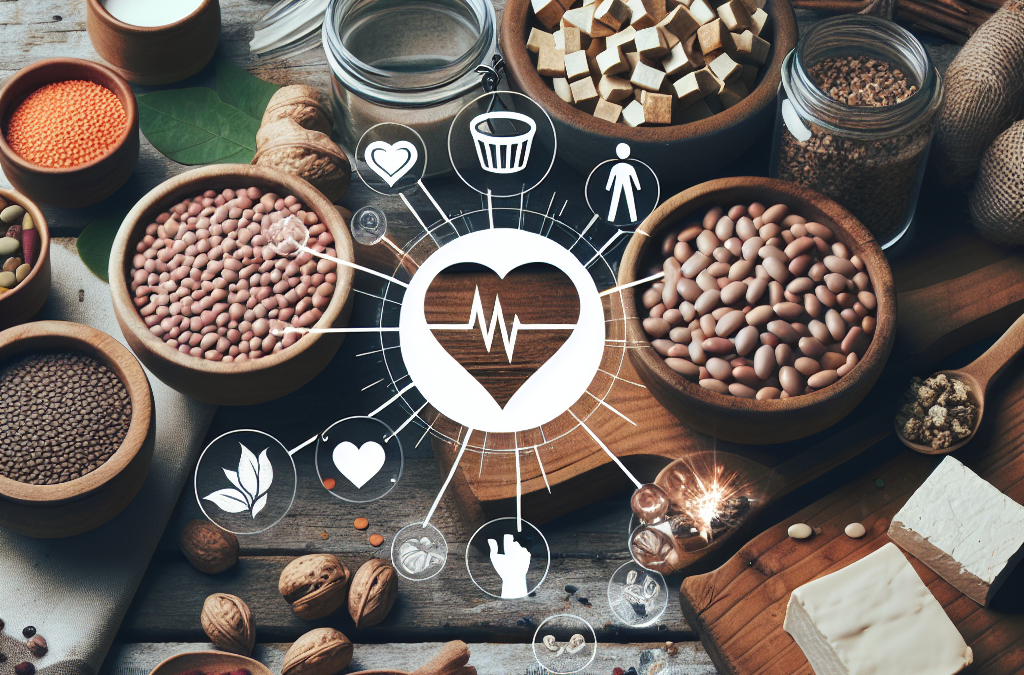Improved Digestion
Fiber-Rich Choices
One of the coolest things about plant-based proteins is how fiber-packed they are. Seriously, foods like lentils, chickpeas, and quinoa not only fill you up but also help keep everything moving along in your digestive tract. I’ve noticed that when I incorporate more plant protein into my diet, things just… flow better, if you know what I mean.
Fiber plays a big role in supporting gut health. It’s like a superhero that helps prevent constipation and supports a healthy gut microbiome. Trust me, nobody likes feeling bloated, and a fiber-rich diet can definitely help with that.
Plus, fiber can help regulate blood sugar levels. I tend to feel more stable energy throughout the day—no more mid-afternoon crashes. It’s pretty amazing what a little extra fiber can do for your overall wellbeing.
Heart Health Support
Lower Cholesterol Levels
Another fantastic benefit I’ve seen is how plant-based proteins can really help lower cholesterol. Foods like beans, peas, and nuts are known to be heart-friendly. I’ve cut back on red meat in my diet, and I honestly feel so much better about my heart health.
When I switched to a more plant-based protein lifestyle, I noticed I was able to lower my bad cholesterol levels. It felt empowering to take charge of my health just by being more mindful of what I included in my meals.
Also, with less saturated fat from animal products, my overall risk of heart disease has decreased. It’s a win-win, and if I can do it, anyone can!
Environmental Benefits
Sustainable Choices
Let’s talk about the environment for a hot sec. By choosing plant-based proteins, we’re not just doing wonders for our bodies, but we’re also helping our planet. I remember the first time I learned about the carbon footprint of animal farming—it blew my mind!
Simply put, plant-based foods require way less water and land to produce compared to meat. When I made the switch, it felt like I was contributing to a healthier Earth. Every plant-based meal is like a little high-five to Mother Nature.
Plus, by reducing our reliance on animal agriculture, we can help combat deforestation and loss of biodiversity. It’s kind of awesome to think about how our food choices can actually change the world.
Variety and Flavor
Exploring New Ingredients
One thing I absolutely love about diving into plant-based proteins is the huge variety of flavors and textures out there. Gone are the days of boring meals. I’m talking about delicious options like tempeh, seitan, and a gazillion different beans!
Get an Amazing Discount on the Best Certified Organic Whole Food Supplement!
Experimenting with different cuisines has been so much fun. I’ve whipped up everything from spicy black bean tacos to creamy quinoa salads. Each recipe brings something new, and it never gets monotonous. It’s like a whole world of culinary adventure waiting to be explored!
Plus, I’ve found that as I tried new plant-based recipes, my cooking skills have improved dramatically. I feel more confident in the kitchen and more connected to my food. Who knew plant-based eating could make me a better cook?
Weight Management
Satiety Without Overeating
And let’s be real—weight management can be a tricky business. But here’s where plant-based proteins come in. They’re so filling, and that’s been a game-changer for me. Instead of mindlessly reaching for snacks, I can fill up on beans, grains, and veggies without overeating.
Since plant-based proteins are often lower in calories and fat, it’s easier to maintain a healthy weight. I’ve been able to enjoy hearty meals without worrying about ruining my efforts to stay fit. It feels amazing to eat until I’m satisfied, not stuffed!
Plus, I feel so energized after enjoying plant-based meals. It’s like giving my body the fuel it really needs. I can’t tell you how great it feels to prioritize health and wellness through my food choices.
Frequently Asked Questions
1. What are some examples of plant-based proteins?
Some popular plant-based proteins include lentils, chickpeas, quinoa, black beans, tofu, and tempeh. These foods are not only rich in protein but also packed with other nutrients!
2. Can I get enough protein from a plant-based diet?
Absolutely! With the right variety of plant foods, you can meet and even exceed your protein needs. Combine different sources like beans and grains for a complete protein profile.
3. Are there any downsides to plant-based proteins?
While plant-based proteins are generally healthy, some people may find them harder to digest initially. It can take some time for your body to adjust, especially if you’re increasing your fiber intake significantly.
4. How can I include more plant-based proteins in my diet?
You can start simple! Add beans to salads, switch out meat for lentils in soups, or try plant-based meat alternatives. There are many delicious ways to sneak in more plant protein!
5. Will eating plant-based proteins help me lose weight?
Many people find that incorporating more plant-based proteins leads to weight management benefits. They’re generally lower in calories and make you feel fuller, which can help control cravings.




